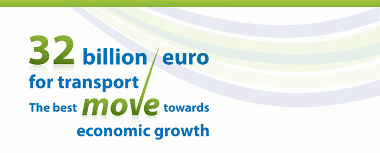-
 Le principali organizzazioni europee dell'industria marittimo-portuale hanno diffuso una lettera aperta, che pubblichiamo di seguito, con cui esortano le nazioni dell'Unione Europea e il Parlamento europeo a salvaguardare i fondi per 32 miliardi di euro che sono stati destinati alle infrastrutture europee di trasporto nell'ambito del budget 2014-2020 del programma comunitario Connecting Europe Facility (CEF). Le principali organizzazioni europee dell'industria marittimo-portuale hanno diffuso una lettera aperta, che pubblichiamo di seguito, con cui esortano le nazioni dell'Unione Europea e il Parlamento europeo a salvaguardare i fondi per 32 miliardi di euro che sono stati destinati alle infrastrutture europee di trasporto nell'ambito del budget 2014-2020 del programma comunitario Connecting Europe Facility (CEF).-
- Le organizzazioni del settore hanno espresso la preoccupazione che non siano resi disponibili fondi sufficienti per coprire le necessità di investimento ed hanno ricordato che i 32 miliardi di euro destinati dalla Commissione Europea al Core Network delle reti trans-europee TEN-T dal programma CEF coprono solo una piccola parte degli investimenti necessari. Inoltre evidenziano che ci sono chiare indicazioni che i finanziamenti destinati al trasporto dal Fondo Europeo di Sviluppo Regionale (FESR), per complessivi 46,7 miliardi di euro nel periodo 2007-2013, saranno notevolmente ridotti e, in alcune regioni, addirittura del tutto stralciati dal nuovo regolamento del FESR. In questo contesto - hanno sottolineato - i 32 miliardi di euro assegnati alle principali infrastrutture delle reti TEN-T nel periodo 2014-2020 costituiscono le risorse minime vitali e devono essere assolutamente garantiti.
 -

- We, European transport organisations, representing European maritime and inland port authorities, airport operators, inland waterway, maritime, rail, road, air transport companies, infrastructure managers, operators, port and logistic service providers, shippers, cyclists, chambers of commerce and transport workers, urge EU Member States and the European Parliament to safeguard the 32 billion EUR budget that has been allocated to EU transport infrastructure within the Connecting Europe Facility (CEF) in the 2014-2020 budget. Achieving a complete and integrated resource-efficient and sustainable transport network, covering and interconnecting all modes, Member States and Regions must be seen as an essential investment to create growth and jobs in the European Union.
-
- The transport industry directly employs around 10 million people in the EU and counts for about 5% of GDP. When related industries (manufacturing, servicing, maintenance, etc.) are included, these figures can be doubled. Besides, transport is one of the sectors where European companies are world leaders in infrastructure, logistics, traffic management systems and manufacturing of transport equipment.
-
- The 2011 EU Transport White Paper confirms the importance of transport and its contribution to Europe’s economy. By 2050, the demand for freight transport activity is expected to raise by 80% and for passenger activity by 51%.
-
- If the EU wants a transport infrastructure network that can meet traffic demand and support economic activity, it will need at least 250 billion EUR by 2020 according to European Commission estimates. This sum will remove bottlenecks and complete missing links in the Core Network. A further 250 billion EUR will be needed to improve the Comprehensive Network to provide accessibility to the Core Network.
-
- The European transport industry is very concerned that not enough funds will be available to cover investment needs. The 32 billion EUR, earmarked by the European Commission to the Core Network in the Connecting Europe Facility only covers a small share of the investment needs.
-
- Moreover, whilst the transport budget proposal looks ambitious at a first glance, it actually compensates important cuts on the side of the regional funds. There are clear indications that transport funds from the European Regional Development Fund (ERDF), which represented 46.7 billion EUR for the 2007-2013 period, will be greatly reduced and, in some regions, even completely removed by the new ERDF regulation. In this context, the 32 billion EUR (or around 3% of the total Multiannual Financial Framework) allocated to the Trans-European transport core infrastructure in 2014-2020 is a vital minimum and must be guaranteed more than ever.
-
Notwithstanding the budgetary constraints all governments face at the moment, we all know transport infrastructure investments pay off in the long run.
-
- We therefore ask European policy makers to fully recognise the added value of the development and completion of an efficient, sustainable and inclusive European transport infrastructure as one of the main driving forces for ensuring economic growth in the European Union and each of its Member States.
-
We urge the Council and Parliament to back this proposal with all necessary means. If not, the proposed review of the Trans-European Transport Network policy remains a sand castle, to the detriment of Europe’s economy.
-
- European Federation of Inland Ports (EFIP) - European Sea Ports Organisation (ESPO) - International Road Transport Union (IRU) - European Community Shipowners’ Associations (ECSA) - Inland Navigation Europe (INE) - European Barge Union (EBU) - Airports Council International (ACI) - European Association for Forwarding, Transport, Logistic and Custom Services (CLECAT) - Community of European Railway and Infrastructure Companies (CER) - European Rail Infrastructure Managers (EIM except Trafikverket) - European Skippers Organisation (ESO) - European Community Association of Shipbrokers and Agents (ECASBA) - European Tugowners Association (ETA) - European Rail Freight Association (ERFA) - European Cyclists’ Federation (ECF) - European Cruise Council (ECC) - European Dredging Association (EuDA) - The Association of the European Rail Industry (UNIFE) - European Boatmen’s Association (EBA) - Eurochambres - MedCruise - Cruise Europe - Association of European Airlines (AEA) - European Transport Workers’ Federation (ETF) - European Shippers’ Council (ESC) - European Maritime Pilots’ Association (EMPA) - The Association of European Vehicle Logistics (ECG)
|
|
|